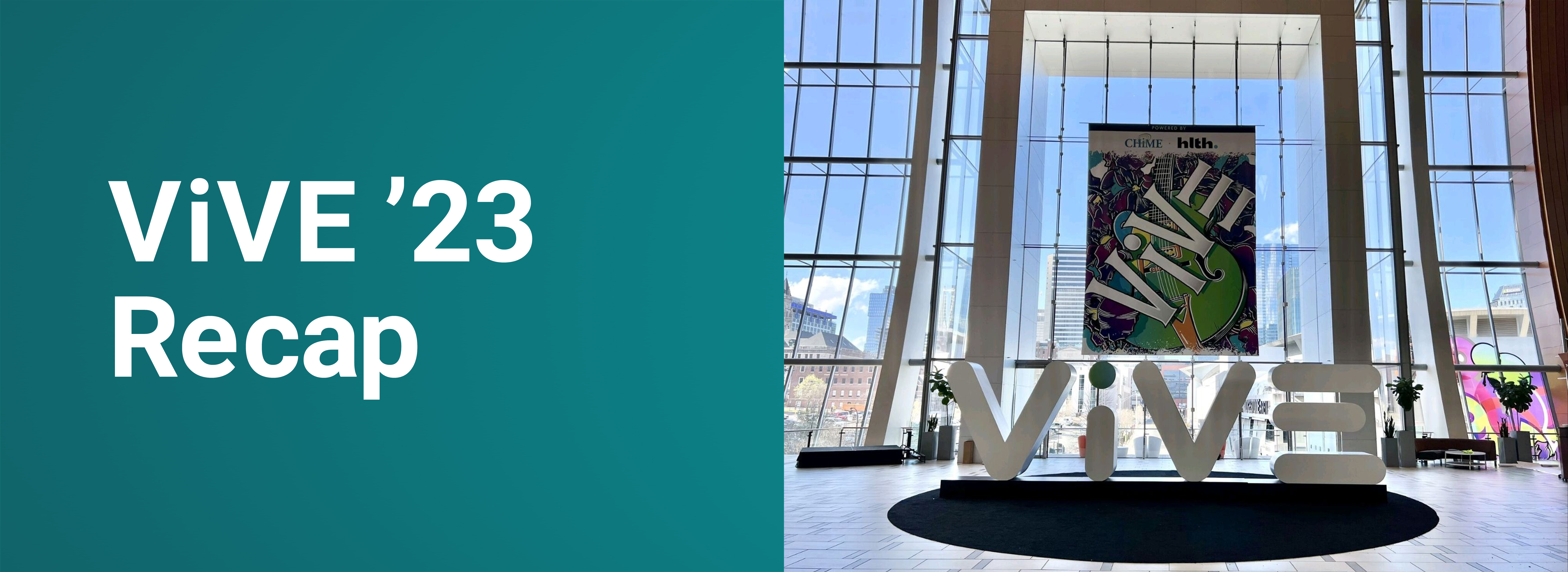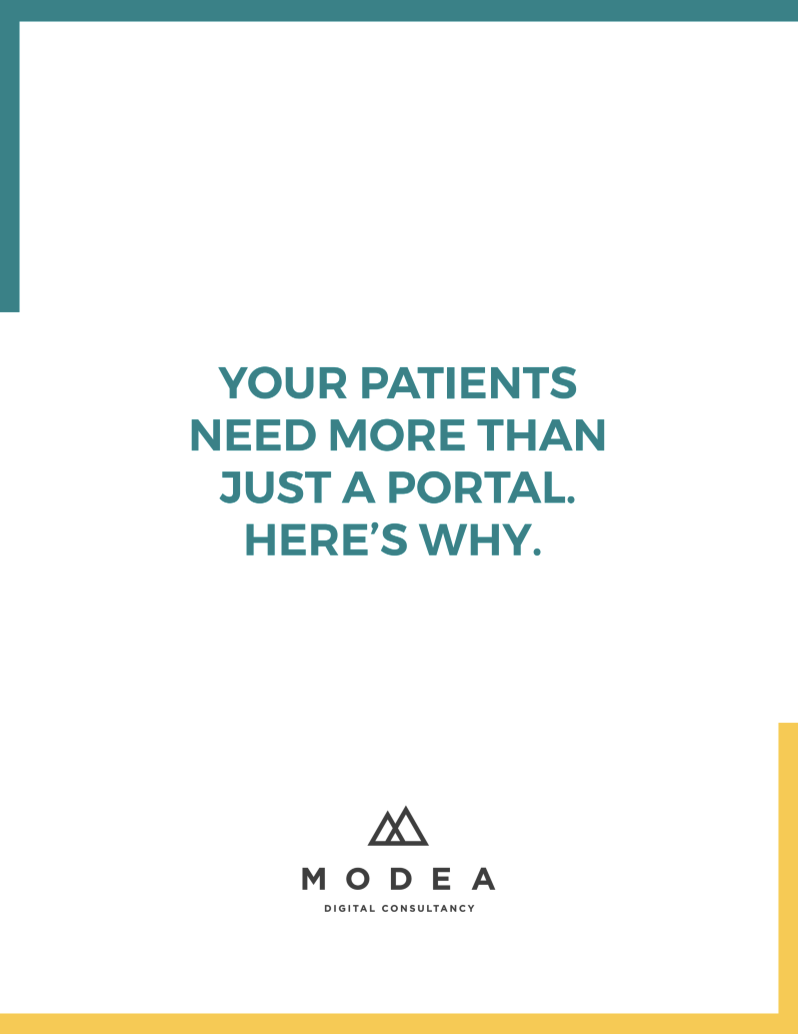
Recently the Modea team had the opportunity to attend ViVE, a digital health conference, in Nashville. In addition to connecting with clients and colleagues, we got to hear from some of the most innovative and influential minds and brands in healthcare.
ViVE aligned closely to our Modea vision of making healthcare more human and personal. We learned how players ranging in size from new startups through technology giants are investing in the digital healthcare space, with collective missions to improve the patient and provider experiences.
Here are the major themes we heard for how innovators are looking to disrupt and improve healthcare.
Theme 1: Interoperability
Interoperability in healthcare refers to the seamless communication between various systems, technologies, applications, and tools to enhance the overall experience for patients, providers, and health systems. In the face of a growing array of technological solutions, maintaining a commitment to interoperability is crucial. This ensures that different devices and applications can effectively communicate and exchange data.
In practical terms, interoperability means the efficient sharing of patient health information (PHI) between the electronic health record (EHR) and other tools. Given the involvement of PHI, preserving patient privacy is of utmost importance. However, achieving the necessary privacy sometimes involves deidentifying patient data, potentially leading to the loss of key data diversity or information about Social Determinants of Health (SDOH) for individuals (see Theme 2). Addressing the challenge of achieving interoperability while maintaining a holistic view of the patient population is a complex task. Many in the healthcare industry are actively working on solutions to this issue.
While retail health options bring benefits to consumers by reducing costs and introducing a more consumer-oriented mindset to healthcare, they also contribute to increased fragmentation. Disjointed or fragmented health data across systems can result in care redundancy, inefficiency, and frustration. In the era of healthcare consumerization, ensuring interoperability remains imperative for fostering patient engagement in their care.
Modea’s takeaway: Invest in digital solutions that fit into your existing workflows and systems to promote, rather than hinder, interoperability.
Theme 2: Health Equity/Social Determinants of Health
There was a lot of discussion around making healthcare delivery more equitable. Social Determinants of Health are the social, environmental, and economic factors that people are born into that affect their health outcomes. Notably, an individual’s zip code stands out as a pivotal determinant of health outcomes. Therefore, when zip code data is de-identified or removed from patient data, crucial facets of health information are overlooked.
Reimbursements, particularly those from Medicaid, play a crucial role in discussions about health equity. The accessibility of certain healthcare services hinges on reimbursement. Without proper reimbursement, lower-income or underserved individuals may face barriers to accessing essential services or treatment options. For example, if healthcare services provided at a community clinic aren’t reimbursed by Medicaid, and that clinic serves a low-income patient population, it diminishes the ability of that population to access necessary care.
There are a ton of startups using predictive analytics to create more equitable care experiences, and we’re interested to see how hospitals and health systems leverage these tools in the future.
Two of these startups we heard from:
Modea’s takeaway: There are countless angles from which to address health equity and healthcare disparities. Understanding your patient population is a great place to start.
Theme 3: Physician Burnout
For physicians reading this, there’s no revelation here. Burnout is a prevalent issue, intensified by additional burdens during the pandemic.
Administrative burden contributes significantly to physician burnout. Regrettably, the introduction of new digital solutions doesn’t always alleviate this burden; at times, it even adds to it. This underscores the crucial need for innovations to seamlessly integrate into existing physician workflows, fostering efficiencies rather than complicating processes.
Physician burnout and early retirements are forcing health systems to resort to hiring contract workers, incurring significantly higher costs. These contract labor expenses stand out as a major contributor to the decline in health system margins. Mitigating physician burnout not only enhances physician retention and financial outcomes but also ensures that physicians and clinical staff can deliver optimal care to patients.
The most promising category of solutions to combat physician burnout? Generative AI, as Theme 4 below details. However, generally speaking, tools that promote physician productivity without introducing additional complexities will improve both the provider and patient experiences.
Modea’s takeaway: Treat your physicians and other staff as you would any customer segment. Their loyalty, engagement, and happiness are key to your health system’s success.
Theme 4: AI
Not surprisingly, AI was the most common theme of the conference. Apart from the word “leverage” (what’s a business conference without it?), “ChatGPT” was the phrase we heard most.
Physicians are enthusiastic about the potential applications of generative AI in personalized treatment planning, diagnostics, clinical decision-making, and enhancing clinical productivity. They also see its value in sifting through extensive EHR data to reduce errors and inform decisions.
Our client, the American Medical Association, hosted an event spotlighting physician innovators and startups who can connect online (or IRL, as was the case at ViVE) via the Physician Innovation Network. During that spotlight we heard several physicians express excitement about the potential of generative AI, so long as the right guardrails are in place.
Modea’s takeaway: AI isn’t going anywhere, and is getting more advanced all the time. While its implications remain to be seen, it’s important to educate yourself on its applications and potential.
Theme 5: Consumerization of Healthcare
The consumerization experience and recognizing patients as consumers remain prominent topics across startups, providers, and big tech companies. This theme has been a consistent focus for us at Modea, and its relevance shows no signs of diminishing in the foreseeable future.
The shift to retail health (think traditional retailers getting into the healthcare game, such as Dollar General and Amazon) is changing consumer expectations of healthcare. Consumers are seeking convenience, transparency, and lower costs, and they’re finding it more easily with these nontraditional “providers.”
A key aspect often discussed in healthcare consumerism is the drive toward personalizing the patient experience. Patients are actively pursuing personalized care on their own terms, utilizing tools like at-home diagnostic kits and wearables. In this context, patients are increasingly open to sharing their health data, particularly when it offers faster access to information about a condition or potential treatments. Healthcare systems that provide personalized digital experiences witness heightened patient engagement, benefiting from streamlined access to care and information.
Modea’s takeaway: Care and health are increasingly happening outside the walls of the hospital. We need to meet consumers where they are, through a combination of digital and analog care solutions.
In the ever-evolving landscape of healthcare, organizations grapple with top-priority initiatives amidst challenges like shrinking margins. However, we envision a bright future driven by technology, innovation, and tools that promise enhanced and timely patient care. In this evolution, we anticipate a stabilization of staff shortages and burnout, with patient journeys becoming more personalized and streamlined.
We look forward to being a part of this future and working to help organizations establish and nurture better relationships with their consumers and patients.




